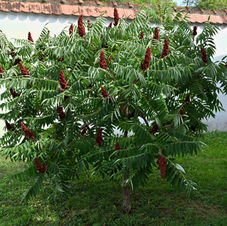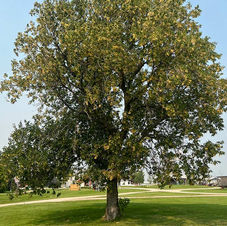Colorado Beautification, One Tree at a Time

Residential & Commercial Service

TREE REMOVAL AND TREE TRIMMING EXPERTS!

Serving Locals for 20+ Years
COMMON TREES IN COLORADO &
THE FRONT RANGE
SUNBURST HONEY LOCUST
The Sunburst honey locust is native to the midwestern United States where it grows in moist and winter-cold locations. It is a fast growing tree with an arching branch habit, reaching 35-50 ft. tall, 30-35 ft. wide. The new growth of this cultivar is bright yellow and very attractive. Flowers are inconspicuous; clusters of 12-18 in. long flattened brown bean-like seed pods ripen by end of summer.
Sunburst honey locust is sometimes grown for shade in parks. It is best adapted to loam soils, and with regular summer moisture.

AUTUMN BLAZE MAPLE
A fast-growing cross between the Silver Maple and Red Maple, the Autumn Blaze features green foliage that turns a bright orange-red in fall. Broad, oval shape with more consistent branching than the Silver Maple.
Max elevation: 6500 ft.
Average mature height: 50′
Spread: 40′

ASPEN
Extremely hardy and well adaptedto high elevations, the quaking aspen comes as a single tree or in clumps, both with fibrous root systems. Native to Colorado, the aspen tree is known for its slim, elegant form, white bark, and signature rustling leaves that turn a brilliant yellow in autumn.
Max elevation: 9500 ft.
Average mature height: 35′

COLORADO SPRUCE
The most popular native evergreen, the Colorado spruce comes in shades of green, blue, and silver. Blue spruces range from pale blue-grey shades to rich, robins-egg blue. With nearly perfect conical shapes and dense horizontal branching, this evergreen is commonly cultivated as Christmas trees.
Max elevation: 9500 ft.
Mature height: 60′
Spread: 25′

BIRCH
Beautiful white trunks exfoliate to reveal patches of tan, cherry, and cinnamon-colored bark underneath. The elegant, pyramid-shaped crown and large, glossy green leaves add to the visual appeal. Hardy and adaptable to wet or dry conditions.
Max elevation: 8500 ft. depending on variety
Mature height: 50′
Spread: 40′

CATALPA
This adaptable tree features large, heart-shaped leaves and showy white June flowers that turn into long, 9″ to 20″ bean pods in autumn. Fast-growing and hardy, this tree provides dense shade and is attractive to many bird species.
Max elevation: 7000 ft.
Mature height: 50′
Spread: 30′

BLACK LOCUST
The black locust (as opposed to the honey locust) features thick, deeply furrowed blackish bark. With bright green, fern-like foliage and dense branching, this tree offers sweet-smelling white or lavender-colored flowers in May and June. Black locusts are both thornless and podless. Symmetrical, rounded or pyramidal crown with straight trunks.
Max elevation: 7500 ft.
Mature height: 50′
Spread: 35′

CANADIAN CHOKE CHERRY
Many versions of the classic cherry tree can be found in the region, from the smallish purple-leaf sand cherry to the taller, graceful Oriental varieties. Lovely almond-scented flowers bloom in April, and the foliage of many types turns an attractive reddish-purple when mature.
Max elevation: 6000-9000 ft.
Mature height: varies; 10′ – 25′
Spread: 10′ to 25′

PINE, AUSTRIAN
Darkest green pine. Heavy, long needles, 2 per bundle. Vigorous, dense grower. Will tolerate heat and cold. Withstands over watering, transplanting, and planting in newly sodded areas much better than Ponderosa Pine.
Max. Elev: 7,500 ft
Mature Ht: 50′ & Spd: 20′

GLOBE SPRUCE
Compact, rounded dwarf spruce of good blue color. Slow grower, densely branched.
Max. Elev: 8,000 ft
Mature ht: 3′ & Sd: 4′

PINE, MUGO / SLOW MOUND
True Dwarf. Dense, mushroom-shaped, dark green pine. Very hardy. Again, this mugo stays dwarf!
Max. Elev: 7,500ft
Mature Ht: 3′ and Spd:4′

SPRUCE, NORWAY / FASTIGIATE
A beautiful, narrow, fast-growing spruce with short, dark green needles. Known to withstand heavy snow loads better than most fastigiate spruce.
Max. Elev: 6,500 ft
Mature Ht: 15′ & Spd: 4′

RIVER BIRCH
Cinnamon, exfoliating bark makes an excellent specimen. Borer resistant. Ragged bark at maturity. Likes sandy soil.
Max. Elev: 8,500 ft
Mature Ht: 50′ & Spd:40′

GINNALA MAPLE / AMUR MAPLE
Informal, small tree with excellent red color in fall. Single-stem speciman, tends to grow slower than clump form.
Max. Elev: 9,500 ft
Mature Ht: 20′ & Spd: 10'

SPRING SNOW CRAB
ardy tree with rich, bright green foliage. Blossoms are white. Tree does not bear fruit!
Max. Elev: 7,500 ft
Mature Ht: 20′ & Spd: 15′

CHANTICLEER PEAR
These evenly branched trees grow more cone-shaped than other flowering pears. Young trees bloom better than the Bradford. White flowers followed by glossy green foliage turning brilliant orange-red in the fall.
Max. Elev: 7,500 ft
Mature Ht: 35′ & Spd: 15′

GREEN VELVET BOXWOOD
From Canada and truly a Zone 4. Rounded, full-bodied shrub with dark green foliage. Holds color through winter.
Max. Elev: 6,500 ft.
Mature ht: 4′ & Spd:2″

EUONYMUS EMERALD GAIETY
Small, erect evergreen. Dense branching with white margin on rich green, rounded leaves.
Max. Elev: 6,000 ft
Mature Ht: 2′ & Spd: 4′

WINTER GEM BOXWOOD
Best used on north sides, protected from winter winds. Little-leaf, slow-growing, loose, upright spreading habit with glossy, bright green, oval foliage.
Max. Elev: 6,000 ft.
Mature Ht: 4′ & Spd:4′

BUFFALO
While commonly found on top of “Buffalo Bill’s” grave, these junipers have soft, feathery branches creating a unique, wide-spreading form. Very hardy. Foliage is bright green. One of the best for high elevations.
Max. Elev: 9500 ft
Mature Ht: 12″
Spd: 6′

SPARTAN & SPEARMINT
Tall, pyramidal with brilliant, rich green foliage. Rapid grower.
Max. Elev: 8,000ft.
Mature Ht: 15′ & Spd: 5′
Spa/SPE 3′ 4′ 5′ 8′

SPIREA GOLDFLAME PINK
Leaves are golden in spring, turning green in summer, and a copper-orange in fall. Light crimson summer flowers.
Max. Elev. 8,500 ft
Mature Ht: 3′
Spd:2′
GFS: 12-15″ 18-24″

GREEN MOUNTAIN BOXWOOD
Faster growing, pyramidal form of boxwood. More conical is left unsheared.
Max. Elev.: 6,000 ft.
Mature Ht: 5′ & Spd: 3′

Maple, Japanese
If you have found the perfect micro climate, we now have many kinds of Japanese maples. Needs protection!
Max. Elev: 5,500 ft.

EUROPEAN MOUNTAIN ASH
European mountain ash, also commonly known as the rowan tree, is a deciduous tree with white flowers but it is grown mostly for its distinctive clusters of red berries that mature in the late summer and persist to add vivid color to a winter landscape. European mountain ash grows best in cool mountainous conditions, and requires full to partial sun, acidic, moist soil, and thrives in unpolluted, salt-free areas.This tree is not actually in the Ash family and is not affected by the Emerald Ash Borer.

KENTUCKY COFFEE
The native Kentucky coffee tree (also known as Kentucky coffeetree), is a tall and picturesque ornamental shade tree with enormous leaves, sometimes up to 3 feet long and 2 feet wide that emerge as pinkish-bronze, then turn blue-green. The majestic Kentucky coffee tree grows best in large open areas with full sun.

FLOWERING CRABAPPLE
Among the most prized of ornamental trees, flowering crabapples have long been a staple of landscape gardening.they are best known for their magnificent display of of blooms in spring and colorful fruit in the fall.

EASTERN RED BUD
The eastern redbud is a vase-shaped, multi-trunk tree covered with pink or white blooms (but not leaves) in winter and is one of the first trees to flower each year. It can get up to 30 feet tall and grows best with at least a few hours of sun.
Eastern redbud tolerates most soils and temperature ranges, including hot summers and cold winters. After flowering, it develops green pods filled with black seeds. It attracts hummingbirds and butterflies.

COLUMNAR SPRUCE
Columnar trees are ideal for adding color, beauty, and elegance to any garden landscape. Tall, skinny trees can create a stunning visual impact when they line driveways, grow along fences, or act as a privacy hedge.

ORNAMENTAL PLUM
Ornamental plum trees are a type of tree that is grown for its decorative purposes. These trees are usually smaller in size and have a more compact growth habit than other types of plum trees. They can be found in a variety of colors, including white, pink, and purple.

ENGLISH OAK
English Oak is often planted for its ornamental value, providing a stately presence in parks, estates, and urban landscapes. The tree does well in areas with adequate moisture but good drainage, tolerating both full sun and partial shade. It is good for privacy. Other varieties are the White Oak, Red Oak and Swamp Oak.

TULIP TREE
Tulip tree is one of the tallest eastern hardwoods, with mature heights ranging from 60 to 90 feet and a spread of 30 to 40 feet. It is fast-growing, especially when young, and can reach a mature height in a relatively short period. It can even grow much taller under favorable conditions.

LINDEN
Linden trees are a statuesque, deciduous species renowned for their stunning foliage, heavy flowering, and handsome form. There are several varieties including Greenspire, Big Leaf, American and and Century.

PINON PINE
The piñon pine, also known as Pinus edulis, is a small evergreen tree native to the southwestern United States, particularly in New Mexico, Arizona, Colorado, and Utah. It is known for its edible pine nuts, which are a significant food source for both wildlife and humans, especially Native American communities.

HAWTHORNE
Hawthorn trees are small fruit-bearing deciduous trees with thorny branches, dark green leaves, and clusters of small white pungent flowers. The fruit from hawthorn trees are small red pome fruits that look like clusters of miniature crabapples. Hawthorns are popular ornamental landscape trees that grow in confined spaces where there are poor soil and drainage.

JAPANESE PAGODA
The Japanese pagoda tree, also known as the Chinese student tree or honey tree, is a charming ornamental species regarded for its graceful silhouette, dense foliage, and fragrant white vegetation. While this tree offers a plethora of benefits, which includes ease of care, adaptability, and natural world attraction, it also possesses positive drawbacks that need to be taken into consideration before planting.








